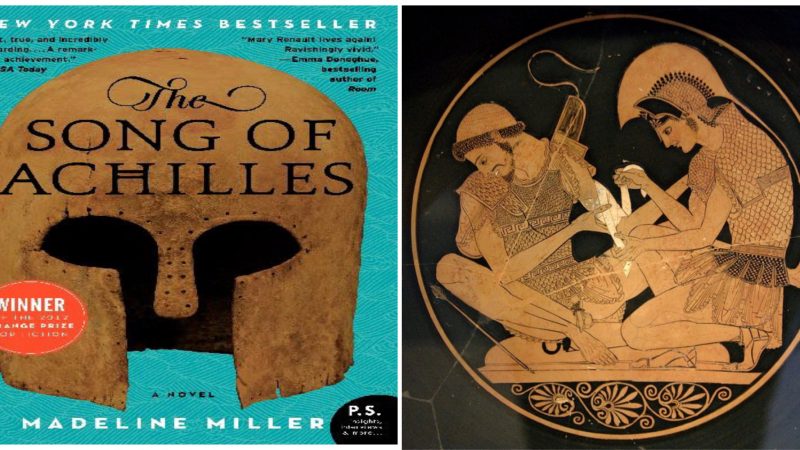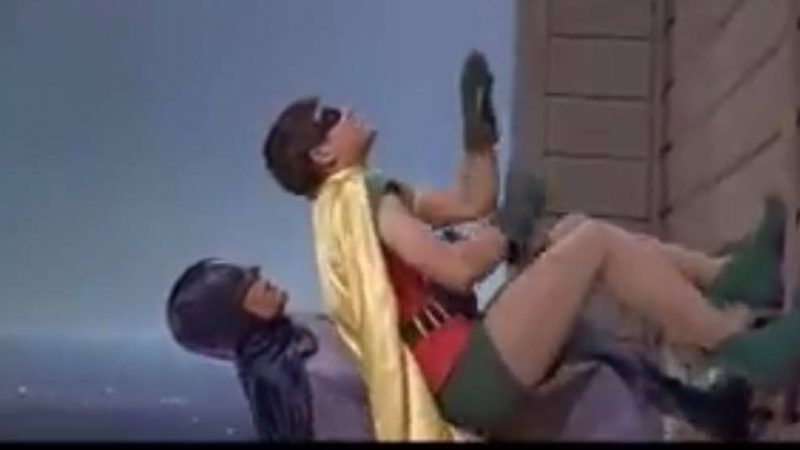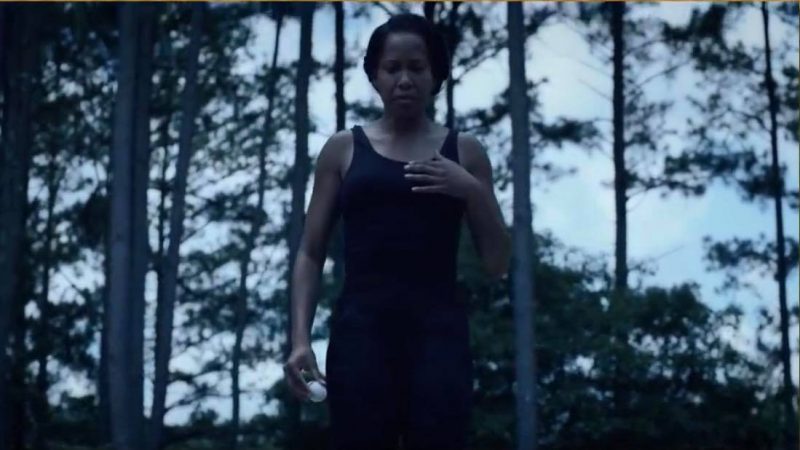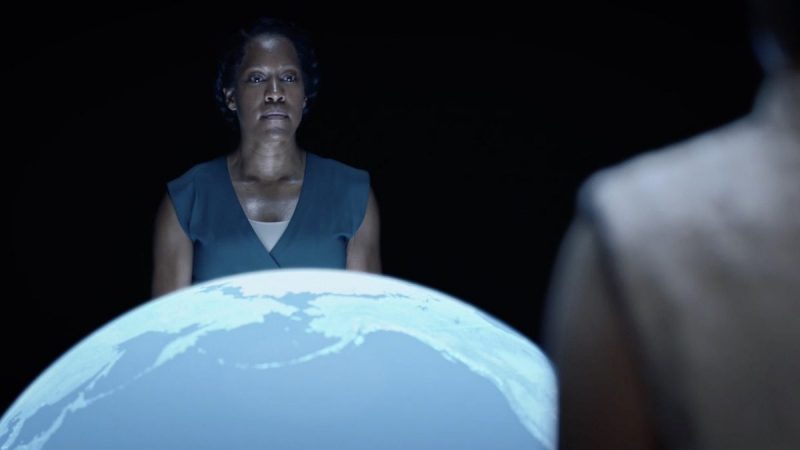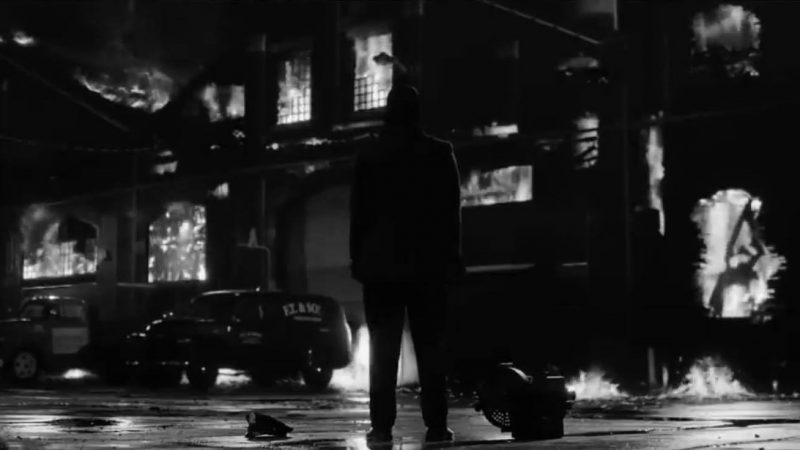We Watch the ‘Watchmen’: Episode 3 Recap and Review
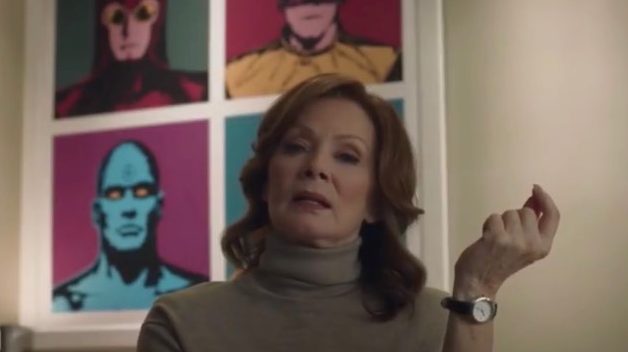
Great news! HBO’s Watchmen shows its first signs of getting good this week. It appears the special ingredient was the introduction of Laurie Blake nee Juspeczyk, A.K.A. the Silk Spectre, one of the protagonists of the original comic. With Laurie comes the rich worldbuilding and moral complexity that had fans excited about this continuation of the story in the first place, so though the episode may feel a little info-dump-y for those who haven’t read the book, we think it’s a sign that this show has real potential. Let’s get recappin’!
We open on a blue phone booth with a cheesy little mobile of a hydrogen atom (Dr. Manhattan’s symbol) on the top. Inside the phone booth, a woman dials, connecting to Mars, and the operator assures her, “Dr. Manhattan is listening.” The woman begins to tell a joke, which culminates with a young girl throwing a brick in the air, before she appears to mess up the punchline. This is a voiceover as we see establishing shots of Washington, D.C., and the same woman gets out of a cab, walks into a bank, and immediately shoots a gun in the air, announcing a robbery. A masked vigilante bursts through the window, and the woman immediately informs him that he was tipped off on the robbery by the FBI, which wanted him to appear so they could capture him. The vigilante runs, and the woman shoots him in the back. As the vigilante is brought into FBI custody on a stretcher (his body armor having saved his life), a protester asks the woman, “Why’d you arrest him? He’s a hero!” “He’s not a hero,” she replies, “he’s a joke.”
In case it’s not obvious yet, the woman is Laurie Blake. We follow her home, where she is just beginning to settle down when there’s a knock on the door. It’s a young man she greets as Senator Keene — for book fans, it’s an easy leap to assume he’s the son of the man whose “Keene Act” banned vigilantism in the late 70s. Keene greets Laurie’s pet owl, Who, and then informs Laurie that she’s being sent to Tulsa to investigate the murder of Jud Crawford. It becomes clear the Keene is the senator from Oklahoma, and is concerned about mounting tensions in the state.
He does not believe the Seventh Cavalry is responsible for the murder, claiming a vigilante may have done it out of “professional jealousy.” Laurie observes that perhaps cops shouldn’t be wearing masks, and Keene responds that the Defense of Police Act (DOPA) that allowed Oklahoma police to hide their identity is the linchpin of his career. Laurie implies that Keene is just worried about missing his chance to become President, and Keene says, ”You know, Laurie, the President can pardon anybody he wants. Anybody. He could even get your owl outta that cage.” Those aware of Laurie’s history will notice the reference to her husband Dan, formerly the vigilante known as Nite Owl; the implication is that Dan is in prison for violating the Keene Act. To emphasize this, the camera zooms in on a Warhol-style painting of four masked heroes, revealing the fourth subject, a young Laurie as Silk Spectre.
Cut to the blue phone booth again. Laurie moves on to telling Dr. Manhattan a second joke, about three heroes arriving at the Pearly Gates. She describes Nite Owl, who God sends to Hell for being “too soft.” During this voiceover, we see Laurie walking into a conference room where several FBI agents are gathered for a summary of the unrest in Tulsa. Slides are running behind the presenter while he speaks, and at one point, an image of Rorschach’s journal pops up. “What the Hell is that?” asks the presenter, and the agent running the slides explained he added it for psychological insight, since the text is important to the Seventh Cavalry. The presenter dismisses this, but when Laurie requests to go to Tulsa alone and is required to take one agent with her, she chooses the slide operator.
As Laurie and the agent’s (his name is Petey) plane starts to descend over Tulsa, they glimpse a tower built by the Veidt Corporation, sparking a conversation about Adrien Veidt, A.K.A. Ozymandias, who has, we are reminded, recently been declared dead. Petey asks Laurie if she knew Veidt, and she calls him out on fishing for information about her famous past. Petey explains that he did his doctoral thesis on the 1977 police riots that lead to the passing of the Keene Act and is more than a “fan.” Laurie concedes that she knew Veidt, saying, “I, too, am not a fan.”
Back in the blue phone booth, the joke continues, with God next interviewing Veidt. Laurie describes Veidt’s master plan of thirty years past — the giant “alien” squid he dropped on several cities to unite world leaders against a perceived outside threat, thus eliminating the very real, human threat of nuclear war. Within the joke, Veidt admits to killing three million people, and God sends him to Hell as well. During this voiceover, we see Laurie arrive in Tulsa and approach Jud Crawford’s house to speak to his widow. Next, we see Laurie and Petey staking out a warehouse; a prisoner transport vehicle pulls up, and a blindfolded man is brutally pushed out of the back.
Laurie approaches them, and the two masked police officers introduce themselves as Red Scare and Pirate Jenny. Laurie asks the prisoner if his civil rights are being violated, cuts off his answer, claiming not to care, and asks the two officers where she can find Looking Glass. They enter the warehouse, which is thick with the sound of barking dogs and prisoners protesting as they are manhandled and forcibly DNA tested. Looking Glass is in the “pod” where he interrogates suspects, and Laurie speaks to him there, revealing that she knows his real name (which, for future reference, is Wade Tillman). Tillman reveals that there was no toxicology report done as part of Jud’s autopsy, and when Laurie asks after Angela Abar, he admits that she is busy preparing for the chief’s funeral, which is a few hours away.
As Laurie and Petey park their car at the cemetery for the funeral, we hear more voiceover from the blue phone booth: the third hero in line at the Pearly Gates is Dr. Manhattan. Laurie’s description of him reminds viewers of his primary traits, namely having superpowers and not caring much about human beings. God sends him to Hell for his indifference.
Laurie and Petey surrender their guns to the police and walk past anti-cop protesters to the chief’s gravesite. Laurie immediately finds Angela and introduces herself, handing her a business card. Angela reads aloud that Laurie is on the anti-vigilante task force, which Laurie confirms. “You know how you can tell the difference between a masked cop and a vigilante?” Laurie asks her. “No,” Angela replies. “Me neither,” says Laurie.
The funeral begins, and Angela gives her eulogy, which, per Jud’s apparent wishes, is an a capella rendition of the song “The Last Roundup.” As she sings, we see a man in a Rorschach mask crawl through a tunnel and emerge inside a chapel — a chapel very close to the gravesite where the funeral is taking place. The man is a suicide bomber, and he announces himself to the mourners, saying that his bomb is wired to his heart and will go off if he dies. He demands that Senator Keene, who is attending, give himself up to save the other people present, calling Keene a “race traitor” who has “declared war on the Seventh Cavalry.” Keene agrees, but before much else can happen, Laurie shoots the bomber in the head. It’s a miscalculation; the bomb starts beeping. Angela orders the mourners to run, then drags the bomber into the open grave, shoving Jud’s coffin down after him to minimize the blast. Knocked to the ground by its force, Laurie and Angela lock eyes. It’s not friendly.
And now for something completely different: the camera pans through a gentleman scientist’s study in grand nineteenth-century style, its tables crammed with drafting papers and strange machinery. We see Veidt sketching what appears to be a suit of armor, tanning leather, sewing, and disassembling a set of medieval-style armor. When he has finished, he suits up one of his androids in what appears to be some sort of leather diving suit with metal helmet and breastplate. He turns on a mechanism on the back of the suit, and the next shot is of the android, dead and covered in frost. Perhaps Veidt sent him up into the air? It’s unclear, but what is clear is that Veidt is furious at his failure; he kicks the corpse, then tells the identical android who asks after him that they need a thicker hide. He rides his horse out into a field, where he finds a herd of buffalo and shoots one in the eye with an arrow, because rich men are strange and awful. When he goes to collect his kill, a gunshot hits the ground at his feet, and he sees a man on a horse in the distance.
He returns home angry, and his maid android brings him a letter that she says is from “the game warden.” The letter claims that Veidt and the warden had “agreed upon the terms of [Veidt’s] captivity” but that Veidt has begun to violate them. Veidt dictates a reply, insisting, “my activities are purely recreational.” He signs the letter under his own name — the first time any non-book-reading viewer will have made the connection. To highlight this, we see Veidt donning his Ozymandias costume.
Back in Tulsa, Keene is speaking to reporters, and Laurie and Petey stand on the sidelines, each holding a coffee. Laurie steals Petey’s coffee and takes it to the chapel, where she finds Angela emerging from the tunnel in her night-vision goggles. Laurie offers her the coffee, admitting that she thought the terrorist was bluffing and is grateful to Angela for saving their lives. She laments, however, that Jud’s corpse is now destroyed, and can’t be exhumed for a second, more thorough autopsy. She also tells Angela that she found the secret compartment in Jud’s closet–the one that, last episode, we saw contained a KKK robe, which Angela stole — and that she knows Angela is hiding whatever she found in it. It’s a tense moment, and Angela responds by pouring the coffee down the tunnel in a clear refusal to cooperate.
Laurie returns to her motel, exhausted. She gets out a locked suitcase that contains, I kid you not, an issue of Esquire where a young Laurie did a photoshoot with Dr. Manhattan, and a huge blue vibrator. There’s a knock on her door, and it’s Petey, in a mask. They have sex. This moment is absolute nonsense; the comic was, it’s true, fascinated with the psychosexual implications of masked vigilantism, but of all the thematic threads to take from it, that hardly seems worth pursuing. Especially if pursuing it involves taking cheap shots at the comic’s one fully realized female character.
In the voiceover, Laurie is drawing to the end of the joke: there’s a fourth person at the Pearly Gates, a woman, who God didn’t see behind the men. It’s Laurie, of course. God asks who she is, and she says, “I’m the girl who threw the brick.” The brick from the first joke lands on God’s head, killing him, and he too goes to Hell. Joke over, Laurie laments that Dr. Manhattan will probably never hear the transmission, and leaves the booth. As she walks away, a car drops from the sky — the one Will was lifted away in by that giant magnet last episode. She looks up, sees Mars in the sky, and laughs. I suppose this is supposed to imply that Dr. Manhattan is somehow involved in the “conspiracy” that Will told Angela about, but I guess we’ll have to wait and see.
Overall, this episode has been a vast improvement. Given the bizarre and frankly unconvincing characterization of Veidt, we worried Laurie’s appearance would be more disappointing than intriguing. For once, we’re happy to be wrong, and hope that Watchmen keeps exceeding the (admittedly somewhat low) expectations it set for us.

